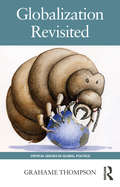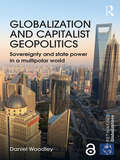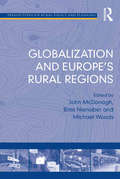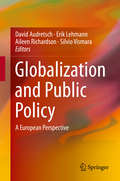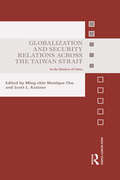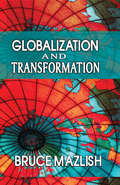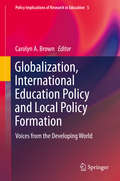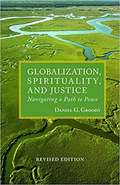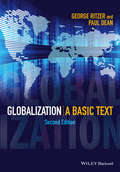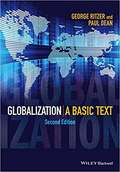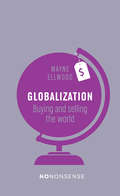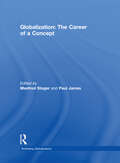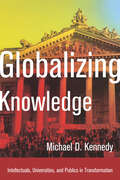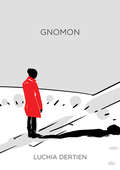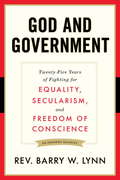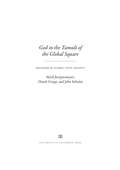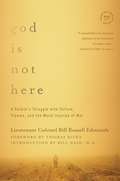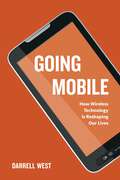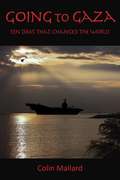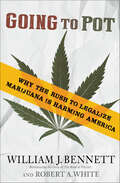- Table View
- List View
Globalization Revisited (Critical Issues in Global Politics)
by Grahame ThompsonWritten by one of the leading scholars of global politics, Globalization Revisited is a major new book for students of globalization. It describes and explains the challenges to liberalism and the global order as result of globalizing forces - from financial interconnectedness to the growth of religious fundamentalisms. The text: provides a detailed analysis of the economic and financial aspects of globalization; examines the changes to global power and governance created by globalization including its effect on the sovereignty of the nation state; discusses recent trends such as the increased use of networks and social media; assesses the rise of globalizing fundamentalism; analyzes the challenges to globalization posed by contemporary events such as the global financial crisis. This book will be essential reading for all students of globalization, and will be of great interest to students of global politics and global governance.
Globalization and Capitalist Geopolitics: Sovereignty and state power in a multipolar world (Rethinking Globalizations)
by Daniel WoodleyGlobalization and Capitalist Geopolitics is concerned with the nature of corporate power against the backdrop of the decline of the West and the struggle by non-western states to challenge and overcome domination of the rest of the world by the West. This book argues that although the US continues to preside over a quasi-imperial system of power based on global military preponderance and financial statecraft, and remains reluctant to recognize the realities global economic convergence, the age of imperial state hegemony is giving way to a new international order characterized by capitalist sovereignty and competition between regional and transnational concentrations of economic power. This title seeks to interrogate the structure of world order by examining leading approaches to globalization and political economy in international relations and international political economy. Breaking with the classical school, Woodley argues that geopolitics should be understood as a transnational strategic practice employed by powerful state actors, which mirrors predatory corporate rivalry for control over global resources and markets, reproducing the structural conditions for corporate power through the transnational state form of capital. In a period of increasing geopolitical insecurity and economic instability this title provides an authoritative yet accessible commentary on debates on capitalism and globalization in the wake of the financial crisis. It is valuable resource for students and scholars seeking to develop a deeper understanding of the historical determinants of the changing dynamics of neoliberal capitalism and their implications for world order.
Globalization and Europe's Rural Regions (Perspectives On Rural Policy And Planning Ser.)
by Birte NienaberThis book examines the multiple ways in which rural regions in Europe are being restructured through globalization and the regional development responses that they have adopted. It provides an understanding of the key challenges and opportunities for rural regions arising from the major economic, social, political and cultural changes associated with globalization, including trade liberalization and economic deregulation, increased international migration, and the rise of global consciousness about environmental issues. Drawing on examples and findings from a major European research project, DERREG, the book presents detailed case studies of ten regions in different parts of Europe, exploring the factors that lead to different experiences of globalization in each of the regions, and highlighting examples of good practice in regional development responses. The book concludes by proposing a typology of regional responses to globalization and considering the policy implications of the research findings. As such, ’Globalization and Europe’s Rural Regions’ is important reading for geographers, sociologists, planners and economists interested in understanding the impact of globalization in rural regions, and for rural development professionals seeking to mobilize effective responses.
Globalization and Mass Politics
by Timothy HellwigThis book analyzes how increases in international trade, finance, and production have altered voter decisions, political party positions, and the types of public issues that parties focus on in postindustrial democracies. Although many studies interrogate whether internationalization matters in regard to policy outcomes and how globalization relates to mass protest, few examine globalization and mass politics more generally. This book argues that by reducing the room in which to maneuver in policy making, globalization reduces the importance of economic-based issues while increasing the electoral importance of non-economic issues. The argument is tested on original and existing data sources.
Globalization and Public Policy
by Silvio Vismara David Audretsch Erik Lehmann Aileen RichardsonThis volume of selected articles was released in light of the new economic, social and environmental challenges Europe and the United States have been faced with following the end of the Cold War and in the evolving era of globalization. National security, immigration, and the provision of health and other key social services call for a radically different outlook in terms of policy discussions. The contributors of this book focus on seven key policy issues and challenges that currently affect the United States and Europe: income distribution, the gender pay gap, crime and security, unemployment, health care, the demographic question, and environmental regulation. The purpose of this volume is to analyze how public policy within the European context is responding to the challenges posed by this new global era.
Globalization and Security Relations across the Taiwan Strait: In the shadow of China (Asian Security Studies)
by Scott L. Kastner Ming-chin Monique ChuThis book presents an interdisciplinary examination of cross-Taiwan Strait relations and the complex dynamics at play in the region. Since the election of Ma Ying-jeou as Taiwan’s president in 2008, the relationship across the Taiwan Strait—long viewed as one of Asia’s most volatile potential flashpoints—has experienced a remarkable détente. Whether the relationship has been truly transformed, however, remains an open question and the Taiwan Strait remains a central regional and global security issue. A return to turbulence in the Taiwan Strait could also add a new dimension of instability in the already tense maritime disputes in the East and South China Seas. While the relationship across the Taiwan Strait remains critically important, it is also changing rapidly, and the chapters in this volume present new thinking to help make sense of complex cross-Strait dynamics. Specifically, these essays explore different security and/or globalization dimensions of China-Taiwan ties as well as the globalization-security linkages that have emerged. As the balance of power in Asia shifts dramatically, several chapters in this volume explore how traditional security forces are evolving. At the same time, there are new dynamics emerging as a consequence of globalization forces, such as the tremendous economic and social integration across the Taiwan Strait, and several chapters in this volume consider some of these new problems. Finally, several chapters consider the often under-researched dynamics associated with the globalization/security interface such as cyber threats, transnational criminal networks and the security spill-over impact of production globalization. This book will of much interest to students of Chinese Politics, Asian Security, globalisation, diplomacy and International Relations.
Globalization and Transformation
by Bruce MazlishIn Globalization and Transformation, Bruce Mazlish examines developments in contemporary warfare, economy, technology, and religion as fundamental factors in human experience that have accelerated global change in recent years. Continuing the analysis he began in Reflections on the Modern and the Global, Mazlish delves into human history, examining who we were so as to help us understand who we are today.Early in the volume, Mazlish highlights the British historian Geoffrey Barraclough, who foresaw the trajectory of world events that gave rise to the "New Global History." He also examines humanity's progress, reminding us of contemporary globalization's precursors: the theories of Charles Darwin; the concept of the global and the local coupled with inquiry into the concept of parts and wholes; merchant empires, such as the English and Dutch East India companies that crisscrossed the ocean in pursuit of profits and power; anti-globalization; and the linkage of globalization to the very concept of humanity.Though globalization is a complex concept, and versatile in its applications, Mazlish focuses on its transformational characteristics, noting that globalization's impact is not uniform across society's culture, politics, or economics. Some parts of the world have yet to accept the challenge to their past traditions. These stimulating essays offer new insights into a major phenomenon of our time.
Globalization, International Education Policy and Local Policy Formation
by Carolyn A. BrownThis edited volume focuses on how international education policy, set by international policymakers and donors, influences local education policy in developing countries. The book's primary purpose is to give voice to scholars from developing countries and regions around the world by inviting them to explore how the international policy, invariably linked to international aid, influences education policy formation and implementation in their country or region and how this influence does or does not meet the local cultural, social, economic, and political needs. A relatively recent and small body of research and commentary supports a discourse that questions how well international education policy mandates such as Education For All serve the needs of developing countries. The intent of this book is to advance this discourse by giving voice to local scholars who observe and study the donor process. The book will be divided into two sections: the first section will set the stage for the discussions in the second section by providing theoretical and historical context for international education policy. As a framework for understanding, the book adopts the position that international policy does not have either the ability or the intent to serve the widely diverse needs of development around the world. International education policy has been formed, historically, by wealthy nations and agencies dominated by Western theoretical paradigms. In recent years, donor countries have made an effort to collaborate with developing countries in developing international education policy goals; however, this collaboration has been limited. Following establishment of the context of international education policy, section II of the book provides a forum for scholars from around the world to openly discuss and critique the impact of international policy on education in their country or region.
Globalization, Spirituality and Justice: Navigating A Path To Peace (Theology In Global Perspective)
by Daniel G. GroodyA theological reading of globalization and a global reading of theology. This book offers a rigorously critical, and yet inspiring, vision of justice as an integral part of Christian spirituality in our complex, globalized world. At the same time, Daniel Groody's analysis draws on the conviction that faith and spirituality have an integral role in the struggle to achieve a more just social order.
Globalization: A Basic Text
by George Ritzer Paul DeanUpdated to reflect recent global developments, the second edition of Globalization: A Basic Text presents an up-to-date introduction to major trends and topics relating to globalization studies. Features updates and revisions in its accessible introduction to key theories and major topics in globalization Includes an enhanced emphasis on issues relating to global governance, emerging technology, global flows of people, human trafficking, global justice movements, and global environmental sustainability Utilizes a unique set of metaphors to introduce and explain the highly complex nature of globalization in an engaging and understandable manner Offers an interdisciplinary approach to globalization by drawing from fields that include sociology, global political economy, political science, international relations, geography, and anthropology Written by an internationally recognized and experienced author team
Globalization: A Basic Text, Second Edition
by George Ritzer Paul DeanUpdated to reflect recent global developments, the second edition of Globalization: A Basic Text presents an up-to-date introduction to major trends and topics relating to globalization studies.
Globalization: Buying and selling the world (No-Nonsense Guides #37)
by Wayne EllwoodGlobalization has an ever-increasing effect on our lives. It has made the world smaller and brought us closer together yet it can also make us more vulnerable and divided. The deregulation of finance and banking and the crisis they led to is a devastating example of the knock-on effects of globalization. This fully revised fourth edition reviews the history and complexities of globalization, examining the forces in play and whose interests they serve. And while the global exchange of people, products, plants, animals, technologies, and ideas intensifies the key question that Wayne Ellwood asks ‘how can globalization be a positive force for change?’
Globalization: The Career of a Concept (ISSN)
by Manfred B. Steger and Paul JamesOne of the keywords of our time, ‘globalization’ frames how we understand our interconnected world. An ambiguous signifier carrying multiple meanings, the term is usually used to refer to the extension and intensification of social relations across the world. Many works have been authored that deal with various aspects of globalization. However, it is surprising that no critical history of the concept has yet provided a historical mapping of its conceptual origins, evolution, and genealogical lineages. This book investigates the meaning formation of ‘globalization’ by featuring interviews with twelve prominent academic pioneers of the new trans-disciplinary field of Global Studies, who were central in forging the ‘career ‘of the concept of ‘globalization’. Together with an introductory chapter, these interviews clarify how and why a previously obscure scholarly concept suddenly exploded in the public discourse of the 1990s. In particular, the interviews trace the processes by which economistic discourses of free market economics became the basis for the influential association of the meaning of ‘globalization’ with the dominant neoliberal framework of the 21st century. This book was originally published as a special issue of Globalizations.
Globalizing Knowledge: Intellectuals, Universities, and Publics in Transformation
by Michael D. KennedyHeralding a push for higher education to adopt a more global perspective, the term "globalizing knowledge" is today a popular catchphrase among academics and their circles. The complications and consequences of this desire for greater worldliness, however, are rarely considered critically. In this groundbreaking cultural-political sociology of knowledge and change, Michael D. Kennedy rearticulates questions, approaches, and case studies to clarify intellectuals' and institutions' responsibilities in a world defined by transformation and crisis. Globalizing Knowledge introduces the stakes of globalizing knowledge before examining how intellectuals and their institutions and networks shape and are shaped by globalization and world-historical events from 2001 through the uprisings of 2011–13. But Kennedy is not only concerned with elaborating how wisdom is maintained and transmitted, he also asks how we can recognize both interconnectedness and inequalities, and possibilities for more knowledgeable change within and beyond academic circles. Subsequent chapters are devoted to issues of public engagement, the importance of recognizing difference and the local's implication in the global, and the specific ways in which knowledge, images, and symbols are shared globally. Kennedy considers numerous case studies, from historical happenings in Poland, Kosova, Ukraine, and Afghanistan, to today's energy crisis, Pussy Riot, the Occupy Movement, and beyond, to illuminate how knowledge functions and might be used to affect good in the world.
Gnomon (Deutsch)
by Melina Wilke Luchia DertienEmile Delaurier ist ein wunderbar militanter Revolutionär, ein Leuchtfeuer der Gerechtigkeit für die ganze Welt. Für Renaire, einen Künstler im stetigen Kampf gegen die Flasche, war es Besessenheit auf den ersten Blick. Seine Hingabe hat zu zwei Jahren tödlicher Partnerschaft geführt, bei der Renaire Delaurier auf seinem unbarmherzigen Weg zur Gleichheit wie ein mörderischer Robin Hood gefolgt ist. Doch dann ändert Delaurier plötzlich sein Muster und nimmt Renaire mit nach Russland, um eine Journalistin ohne jede unmoralische Vergangenheit zu töten, und ohne seine Tat zu erklären. Als Interpol Kontakt zu Renaire aufnimmt, hat er eigentlich schon genug Probleme – Delaurier am Leben erhalten, mit ihrer veränderten Beziehung klarkommen und seine eigene Vergangenheit überleben, die ihn immer noch verfolgt. Doch als er erfährt, was Interpol von ihm will, muss Renaire der Wahrheit über Delaurier ins Gesicht sehen: dass ein edler Mann nicht immer ein guter Mann ist. Er steht vor einer Entscheidung, die kein Mann jemals treffen sollte – soll er seinem Herzen oder seiner Moral folgen?
God and Government
by Rev Barry LynnA central player in every major church-state-separation battle for decades, the Rev. Barry W. Lynn understands the complexities of this divisive issue like few others. As a long-time activist, a civil rights lawyer, and an ordained minister in the United Church of Christ, he offers a unique perspective and a wealth of experience on church-state controversies. In this lively book, he has compiled his writings from various sources to explore in depth the many ways religious extremists have attempted to erode individual liberties.The topics range from publicly-promoted prayer to efforts to undermine public education and replace it with taxpayer-subsidized vouchers for religious schools, interfering with end-of-life and reproductive rights, censorship, and belligerence directed against nonbelievers and minorities.Lynn concludes that the ultimate goal of these extremist forces--consisting mainly of the Protestant Religious Right and the Roman Catholic hierarchy--is the creation of a corporate theocracy, a decidedly undemocratic system of government in which nonconservative Christians, along with humanist, feminists, and the LGBTQ community, are relegated to second-class status in America.From the Trade Paperback edition.
God in the Tumult of the Global Square: Religion in Global Civil Society
by Mark Juergensmeyer Dinah Griego John SoboslaiHow is religion changing in the twenty-first century? In the global era, religion has leapt onto the world stage, though often in contradictory ways. Some religious activists are antagonistic and engage in protests, violent acts, and political challenges. Others are positive and help to shape an emerging transnational civil society. A new global religion may be in the making, providing a moral and spiritual basis for a worldwide community of concern about environmental issues, human rights, and international peace. God in the Tumult of the Global Square explores all of these directions, based on a five-year Luce Foundation project that involved religious leaders, scholars, and public figures in workshops held in Cairo, Moscow, Delhi, Shanghai, Buenos Aires, and Santa Barbara. In this book, the voices of these religious observers around the world express both the hopes and fears about new forms of religion in the global age.
God is Not Here: A Soldier's Struggle with Torture, Trauma, and the Moral Injuries of War
by Thomas Ricks Bill Nash Lieutenant Colonel Edmonds George LoberGod Is Not Here is a powerful and intimate look into torture and its effect on both the tortured and the torturer. In May of 2005, the U.S. government finally acknowledged that the invasion of Iraq had spawned an insurgency. With that admission, training the Iraqi Forces suddenly became a strategic priority. Lt. Col. Bill Edmonds, then a Special Forces captain, was in the first group of "official" military advisors. He arrived in Mosul in the wake of Abu Ghraib, at the height of the insurgency, and in the midst of America's rapidly failing war strategy. Edmonds' job was to advise an Iraqi intelligence officer--to assist and temper his interrogations--but not give orders. But he wanted to be more than a wallflower, so he immersed himself in the experience, even learning Arabic. In a makeshift basement prison, over countless nights and predawn hours, Edmonds came to empathize with Iraqi rules: do what's necessary, do what works. After all, Americans and Iraqis were dying. Edmonds wanted to make a difference. Yet the longer he submerged himself in the worst of humanity, the more conflicted and disillusioned he became, slowly losing faith in everything and everyone. In the end, he lost himself. He returned home with no visible wounds, but on the inside he was different. He tried to forget--to soldier on--but memories from war never just fade away... In God Is Not Here, the weight of history is everywhere, but the focus is on a young man struggling to learn what is right when fighting wrong. Edmonds provides a disturbing and thought-provoking account of the morally ambiguous choices faced when living with and fighting within a foreign religion and culture, as well as the resulting psychological and spiritual impacts on a soldier. Transcending the genre of the traditional war memoir, Edmonds' eloquent recounting makes for one of the most insightful and moving books to emerge from America's long war against terrorism.
God, Guns, Grits, And Gravy
by Mike HuckabeeThe New York Times Bestseller!<P><P> In God, Guns, Grits and Gravy, Mike Huckabee asks, "Have I been taken to a different planet than the one on which I grew up?" The New York Times bestselling author explores today's fractious American culture, where divisions of class, race, politics, religion, gender, age, and other fault lines make polite conversation dicey, if not downright dangerous. As Huckabee notes, the differences of opinion between the "Bubble-villes" of the big power centers and the "Bubba-villes" where most people live are profound, provocative, and sometimes pretty funny. Where else but in Washington, D.C. could two presidential golf outings cost the American taxpayers $2.9 million in travel expenses?<P> Government bailouts, politician pig-outs, and popular culture provocations from Jay-Z and Beyoncé to Honey Boo-Boo to the Duck Dynasty's Robertson family. Gun rights, gay marriage, the decline of patriotism, and the mainstream media's contempt for those who cherish a faith-based life. The trouble with Democrats, the even bigger trouble with Republicans, our national security complex, and how our Constitution is eroding under our noses. Stories of everyday Americans surviving tough times, reflections on our way of life as it once was, as it is, and as it might become…these subjects and many more are covered with Mike Huckabee's signature wit, insight, and honesty.<P> At times lighthearted, at others bracingly realistic, Huckabee's brand of optimistic patriotism highlights American ideals, offering a bright outlook for future generations.<P> With a wry eye for the ridiculous and a clear-eyed look at the most controversial issues of our time, God, Guns, Grits and Gravy is Mike Huckabee at his very best.
Going Dark (The Red Trilogy #3)
by Linda NagataIn the third book in The Red Trilogy, former Army Lt. James Shelley becomes a black ops sniper working for the Red--a suspected rogue artificial intelligence that is ripped from today's headlines.James Shelley has left his lover, Delphi, and his companion-in-arms, Jayne Vasquez, with a fortune acquired from a fallen oligarch. They believe him to be dead, and he doesn't try to set the record straight. His long-running question has been answered: There are other soldiers like him who have served the purposes of the Red--and he has accepted his place among them. As a soldier of the Red he pursues covert missions designed to nudge history away from existential threats--but that doesn't mean the world is growing more orderly. It's only in the froth of a "managed chaos" that human potential can grow and thrive. Shelley's missions eventually take him into orbit--and into conflict with those he loves--Delphi and Jaynie--who are determined to escape the influence of the Red.
Going Mobile
by Darrell M. WestThe world is going mobile at an astounding pace. Estimates show 80 percent of global Internet access will take place through mobile devices by 2016. Smartphones, tablets, and handheld devices have reshaped communications, the global economy, and the very way in which we live. The revolution is an electronic nirvana: for the first time in human history we have sophisticated digital applications to help us learn, access financial and health care records, connect with others, and build businesses. But the one trillion dollar mobile industry is still relatively young. Leaders in both the public and private sectors need to figure out how to apply mobile technologies or mobile devices to optimize education, health care, public safety, disaster preparedness, and economic development. And the ever-expanding mobile frontier presents new challenges to law, policy, and regulations and introduces new tensions; one person's idea of cautious deliberation can be another's idea of a barrier to innovation.In Going Mobile, Darrell M. West breaks down the mobile revolution and shows how to maximize its overall benefits in both developed and emerging markets.Contents1. The Emergence of Mobile Technology2. Driving Global Entrepreneurship3. Alleviating Poverty4. Invention and the Mobile Economy5. Mobile Learning6. Improving Health Care7. Medical Devices and Sensors8. Shaping Campaigns and Public Outreach9. Disaster Relief and Public Safety10. Looking Ahead
Going Mobile
by Darrell M. WestThe world is going mobile at an astounding pace. Estimates show 80 percent of global Internet access will take place through mobile devices by 2016. Smartphones, tablets, and handheld devices have reshaped communications, the global economy, and the very way in which we live. The revolution is an electronic nirvana: for the first time in human history we have sophisticated digital applications to help us learn, access financial and health care records, connect with others, and build businesses. But the one trillion dollar mobile industry is still relatively young. Leaders in both the public and private sectors need to figure out how to apply mobile technologies or mobile devices to optimize education, health care, public safety, disaster preparedness, and economic development. And the ever-expanding mobile frontier presents new challenges to law, policy, and regulations and introduces new tensions; one person's idea of cautious deliberation can be another's idea of a barrier to innovation.In Going Mobile, Darrell M. West breaks down the mobile revolution and shows how to maximize its overall benefits in both developed and emerging markets.Contents1. The Emergence of Mobile Technology2. Driving Global Entrepreneurship3. Alleviating Poverty4. Invention and the Mobile Economy5. Mobile Learning6. Improving Health Care7. Medical Devices and Sensors8. Shaping Campaigns and Public Outreach9. Disaster Relief and Public Safety10. Looking Ahead
Going to Gaza: Ten Days that Changed the World
by Colin MallardGoing to Gaza, Ten Days That Changed the World, weaves an amazing story set in one of the most persistent conflict areas of the world. Our inability to solve this conflict has undoubtedly contributed to the rise of violent religious fundamentalism. What can we do? Seventy years of continuous war suggests we haven't found the solution. What if we tried something else, something really different, something never tried before? Going to Gaza is about such an undertaking. It is an exciting and suspenseful story, a sequel to the award winning book, Stillpoint, a novel of war, peace, politics and Palestine. The events described in Going to Gaza are a combination of fact and fiction, of beautiful dreams and ugly realities--reflections of us, our nature as human beings.
Going to Pot: Why the Rush to Legalize Marijuana Is Harming America
by William J. Bennett Robert A. WhiteWilliam J. Bennett, former director of the National Drug Control policy under President George H.W. Bush and bestselling author of The Book of Virtues, and co-author Robert White provide strong societal and scientific arguments against the legalization of marijuana. Marijuana, once considered worthy of condemnation, has in recent years become a "medicine," legalized fully in four states, with others expected to follow. But the dangers are clear. According to Bennett's research, more Americans are admitted to treatment facilities for marijuana use than for any other illegal drug. Studies have shown a link between marijuana use and abnormal brain structure and development. From William Bennett comes a call-to-action for the 46 states that know better than to support full legalization, and a voice of reason for millions who have jumped on the legalization bandwagon because they haven't had access to the facts.
Gold, the Dollar and Watergate
by Onno de Beaufort WijnholdsThe book examines the problems that Nixon faced during his presidential term, focusing on economics but the role of politics is also highlighted. The convergence of the gold-dollar crises, oil crises and Watergate imbroglio posed a unique political and economic threat to global stability.
